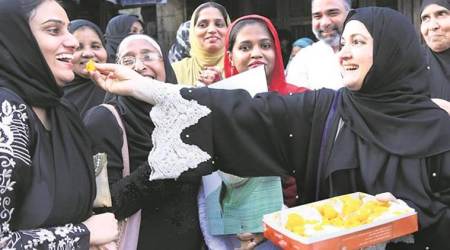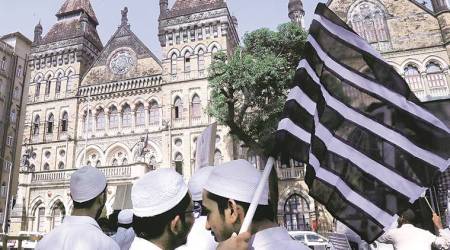 Muslim women celebrating Supreme Court’s verdict on triple talaq. (Express photo by Vishal)
Muslim women celebrating Supreme Court’s verdict on triple talaq. (Express photo by Vishal)
The All India Muslim Personal Law Board has called an executive meeting on September 10 to discuss the Supreme Court verdict on triple talaq and whether the board should move a review petition. While seeking to portray the verdict as a victory for personal laws based on religion, board members appeared uncertain about the import of the verdict, including the fate of Muslim divorces.
General secretary Maulana Wali Rehmani said that for the next six months, until the government brings a law as directed by the Supreme Court, there would not be any Muslim divorces. On the other hand, member Kamal Farooqui, who is also a lawyer, said the judgment pertains to instantaneous triple talaq and hence talaq over the prescribed period of 90 days would continue as usual. “It is a big victory for us. The Supreme Court verdict means personal laws in this country are protected,” Farooqui said.
“As per the judgment triple talaq is banned for six months,” Rehmani told The Indian Express. “But the other part of the judgment that is crucial is that the court has ruled that it has nothing to do with Muslim personal laws… I cannot comment whether the government should bring a law unless I see what that law is.”
Farooqui maintained the judgment does not restrain willing Muslim couples from divorcing. “What the court has said on triple talaq is not really different from what we have been saying all along. We have been saying it should be discouraged, eradicated,” said Farooqui. “But there are different schools of thought in the country and not everybody would agree with the doing away with the practice…”
In Lucknow, AIMPLB member Khalid Rasheed Farangi Mahali said: “The court has put a ban on the practice for six months but what will happen if one couple decides to separate through triple talaq in this period? What will happen if a person marries someone else after triple talaq? There are several questions.”
AIMPLB lawyer Kapil Sibal called it a “marvellous judgment” that “protects the personal laws of every religious community”. “.. As far as this practice is concerned, only this practice, of triple talaq administered in one sitting, is bad for two different reasons. Two judges say it is bad because it is violative of Article 14 and one judge says it is bad because it is not accepted by the Quran,” Sibal told reporters. He noted it is a minority judgment that has asked that the government pass legislation. “There is no need to bring a law,” he said. “How this will translate on the ground is a different matter.” Minorities Minister Mukhtar Abbas Naqvi sidestepped the question of legislation.
“India has had major social reforms periodically, we abolished Sati, outlawed child marriages. Triple talaq is inhuman, unconstitutional, a social evil. But not everything is the remit of the government, society has to come forward to create awareness. We will do everything that is required to uphold the Constitution and the dignity of Muslim women,” Naqvi said.
Other Muslim groups
From the Jamiat Ulama-e-Hind, which has been a party to the case from the beginning, working committee member Niaz Farooqui said: “We are studying the judgment, there is a meeting to discuss it. We can comment on it only after that.” Shaista Amber of All India Muslim Women Personal Law Board, who had been opposing triple talaq, called the verdict “historic”. Maulana Yasoob Abbas of Shia Personal Law Board said they have been fighting against “instant triple talaq” and the SC verdict will lead to its end.

